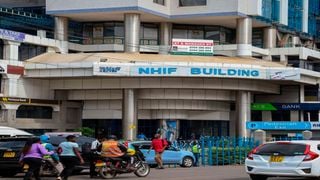
The National Hospital Insurance Fund building Nairobi County in this picture taken on March 16, 2023.
| Dennis Onsongo | Nation Media GroupNews
Premium
Tender wars: State blocks NHIF from lucrative commercial tenders
President William Ruto’s push for Universal Health Coverage (UHC) has received a major boost after the Public Procurement Regulatory Authority (PPRA) barred National Health Insurance Fund (NSSF) from engaging in the commercial insurance business.
NHIF, since renamed the Social Health Insurance Fund (SHIF) following the repeal of the NHIF Act, will now focus its energies on the development of social health insurance to cushion a majority of poor Kenyans from high cost of healthcare especially for terminal illnesses.
The SHIF is established under the Social Insurance Act, one of the laws that replaced the NHIF Act. In the October 27, 2023 circular to all accounting officers in government ministries, departments and agencies, PPRA Director-General Patrick Wanjuki said only bidders who meet the requirements of the Public Procurement and Asset Disposal (PPAD) Act must be considered in the bidding process.
“The purpose of this circular is to therefore remind all accounting officers of the need to adhere to the eligibility to bid requirements set out in the Act,” says Mr Wanjuki.
President Ruto has been clear that UHC can only succeed if NHIF concentrates on the development of a social health insurance plan.
The PPRA circular is anchored on section 55 of the PPAD Act, which provides that an entity is eligible to bid for a contract in procurement if it satisfies the requirements of the Act.
The Act makes it mandatory for the tenderer to have the legal capacity to enter into a contract and be a member of a regulated profession and satisfy all professional requirements.
NHIF was not allowed to engage in commercial insurance business as it is not registered as a commercial insurance provider and is therefore not regulated by Insurance Regulatory Authority (IRA) as stipulated under the Insurance Act that feeds into the PPAD Act.
Section 19 of the Insurance (Amendment) Act of 2019 provides that only entities registered under IRA may undertake commercial insurance business. This led to NHIF pulling out of the commercial insurance business. However, through a gazette notice on June 16, 2020, then National Treasury Cabinet Secretary Ukur Yattani exempted NHIF from the provisions of section 19 of the Insurance Act, effectively rendering the PPAD Act inapplicable.
The exemption of NHIF from the requirements of the law saw it contracted by government agencies for the provision of enhanced schemes and other benefits to over 120,000 civil servants and National Youth Service staff and over 131,000 police and prison officers.
This included Group Personal Accident, Work Injury Benefits, Group Life, and Last Expense insurance covers.
Also Read: How new medical scheme will work
Because of lack of capacity, NHIF would then bring on board private insurance companies to provide the services and charge a five per cent administration fee to every contract awarded to the underwriters.
The five per cent fee became an attractive avenue for NHIF to mint money and therefore turned its back on its core mandate of social insurance services.
However, SHI, as structured in the Act, will cater for all medical needs of all members on an end-to-end basis barring need for public institutions to take up commercial health insurance schemes.
“Accounting officers should ensure that persons bidding for a contract in public procurement or asset disposal, provide evidence or information to establish that they fulfil all the eligibility requirements,” the notice by Mr Wanjuki reads in part.
An amendment to the Insurance Act in 2017, under the Statute Law (Miscellaneous Amendment) Act, provides that the penalty for such officers placing risks with insurers and re-insurers not registered under the Act is Sh5 million or a jail term not exceeding five years or both.
Section 38 of the procurement law states that the penalty shall be administered after the PPRA boss is satisfied that there is a breach of the law, regulations or any directions of the authority.
The Act further states that, in the event the contract has been awarded illegally, the PPRA boss may “direct the procuring entity to rectify the contravention, terminate the procurement proceedings and require the procuring entity to transfer procuring responsibilities of the subject procurement to another procuring entity.”





